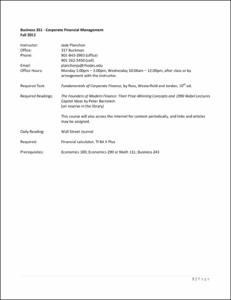Please use this identifier to cite or link to this item:
http://hdl.handle.net/10267/14992| Title: | BUS 351-01, Corporate Financial Management, Fall 2012 |
| Authors: | Planchon, Jade |
| Keywords: | Business, Department of;Syllabus;Academic departments;2012 Fall;Curriculum |
| Issue Date: | 24-Aug-2012 |
| Publisher: | Memphis, Tenn. : Rhodes College |
| Series/Report no.: | Syllabi CRN; |
| Abstract: | Corporate Financial Management is an introductory finance course that is required for all Commerce and Business majors. It is designed to cover those areas of finance that are important to all managers whether they specialize in finance or not. The course will be divided into four parts: Part I: Tools – In the first phase of course, students will be introduced to the tools that are imperative for survival in the later parts of the course. Major topics include financial statement and ratio analysis, time value of money and discounted cash flows. Part II: Valuation & Investment Decisions – Students will be exposed to fixed income and equity valuation and will be challenged to leverage the tool set derived from Part I of the course. This part of the course also covers capital investment decisions (i.e., determining which investments a firm should undertake). Part III – Risk / Return & Capital Asset Pricing Model (CAPM) – Students will learn about CAPM which is widely used in capital budgeting and is one of the cornerstones of modern finance. Additionally, the course will review the key contribution of the Nobel laureates Markowitz and Sharpe. Part IV – Cost of Capital & Capital Structure: In the final part of the course, students will consider firms financing decisions. What mix of debt and equity should the firm use to raise funds to finance its investments? In order to answer this question, students will learn to calculate the weighted average cost of capital (WACC). A course outline is provided on pages 7 and 8 that summarizes the major topics covered throughout the semester. Excel spreadsheets and financial calculators will be leveraged to master many of these topics (specifically, performing financial analysis and making capital budget decisions). Additionally, students will become familiar with contemporary financial issues and key contributions of the Nobel laureates in financial economics (Markowitz, Sharpe, and Miller and Modigliani). |
| Description: | This syllabus was submitted to the Office of Academic Affairs by the course instructor. Uploaded by Archives RSA Josephine Hill. |
| URI: | http://hdl.handle.net/10267/14992 |
| ISSN: | 13316 |
| Appears in Collections: | Course Syllabi |
Files in This Item:
| File | Description | Size | Format | |
|---|---|---|---|---|
| 2012_fall_BUS_351-01_13316.pdf | 339.29 kB | Adobe PDF |  View/Open |
Items in DSpace are protected by copyright, with all rights reserved, unless otherwise indicated.